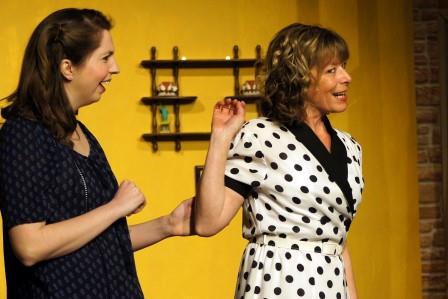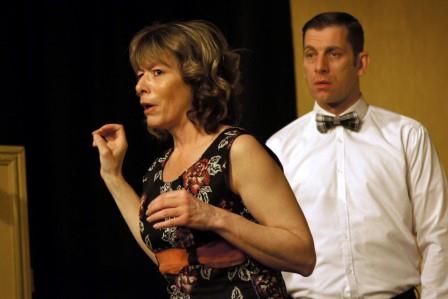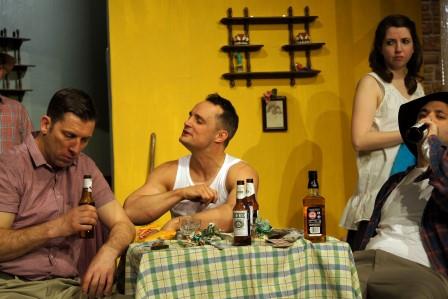|
|
||||||||||||||||||||||||||||||||||||||||||||||||||||||||||||||||||||||||||||||||||||||||||
Click
here for more pictures of this play |
||||||||||||||||||||||||||||||||||||||||||||||||||||||||||||||||||||||||||||||||||||||||||
|
||||||||||||||||||||||||||||||||||||||||||||||||||||||||||||||||||||||||||||||||||||||||||
|
National Operatic & Dramatic Association London Region
Be inspired by amateur theatre Show Report I am always delighted when I am available to come along and report on your show because Andrew is unable to, and this visit was no exception. Tennessee Williams is a very in-depth writer and one which a lot of societies either will not or cannot attempt to do……not so LADS. Almost everything LADS does is good/excellent in varying degrees but I really felt that this production pushed the boundaries. I was delighted to see almost a full house, because this is not feel-good stuff – it is ‘nitty gritty real life this is what happens to people’ stuff done really well. I was so pleased that the Director, Jean Cooper, and the cast did not attempt to sanitize the script. ‘Streetcar’ is very much of its time and the values and social mores need their original setting for the audience to appreciate how very shocking they were in their day. It also gives the cast an opportunity to display some very controversial attitudes and responses which, maybe with our modern thinking, would not make for such an emotional high-octane piece, enabling the cast to draw on their reserve of acting talent to achieve this. From the very start the open curtains showing a composite set, poorly furnished in accordance ith the life Stella and Stanley were living,, with half-walls allowing the audience to see the actors all the time, let us know that there was no surplus money here available for life’s luxuries. Everything was well placed with the bedroom SL and the kitchen US, allowing good movement through the main living area from the front door, making full use of the stage. Doors off the bedroom to the bathroom were also well placed. With the kitchen US and the refrigerator SL in that alcove, there was no necessity to have a ‘period’ fridge which might have proved troublesome, but it was a working prop which extended the illusion….and the door was full of bottles!!! The old cooker placed within that kitchen area worked well and looked authentic. The use of the apron DSR leading to the upper portions of the house, where Steve and Eunice lived, extended the playing area well, and allowing the cast to use the floor of the auditorium and the two exits to indicate various street scenes, opened up the whole ‘community’ area. Congratulations to Gary Cooper for his vision and interpretation – no doubt in conjunction with the Director. For this production the music was excellent and especially suitable and evocative, helping tremendously to set the scene and the era. Well done to Andrew Rogers for sourcing such a comprehensive range of music and sounds – the sound of the streetcars was just the right level to let us know they were not too far away. Music also plays an important part in the play as a mood setter. We were also made very aware of Blanche’s state of mind when she hears the ‘music’ and put her hands over her ears to blot it out. This memory of the time her young husband was found in a compromising situation with an older man, and then subsequently shot himself was brought back to her, and indicated to the audience, by the polka from the event culminating in the gunshot – thus releasing Blanche from her auditory hallucinations. Lighting, too, was well designed and just the correct level at all times….when Mitch and Blanche returned from their night out that low lighting gave us just enough visibility, but not too much to destroy the atmosphere. Congratulations also to Wardrobe (Liz Adams and Sylvia Zilesnick) and Properties (Sue Bonner) who managed to create and maintain the 1948 hardship of New Orleans. Overall the crew moved with speed and precision when re-setting and were never intrusive to the action. You are very fortunate in having such a wealth of good performers in your group and this production used four of them as the main protangonists to perfection, each giving highly-charged and emotional performances within the confines of their character. From the very start the play moved at a good pace with no hesitations at all, making sure that the audience were engaged from the beginning. The accents were all consistent throughout and it only took a few minutes for me to ‘tune in’ my ears to the drawl of the New Orleans dialect. When delivering ‘important’ dialogue speech was very clear, but when it was all secondary and peripheral there was some babble and chatter, not out of place in such an excitable community. The difference in the two sisters was very marked from the beginning. Stella Kowalski (Sarah Hudson) was down to earth, kind, realistic, trusting and easy-going. All these emotions she portrayed very convincingly and naturally. Outwardly very happy with her life with Stanley at the start of the play we see how the presence of Blanche affects him (and ultimately her), and how finally she comes to a kind of acceptance of the man he is and the life she will have with him. She showed genuine affection to Blanche, aware of her fragile mental stage, but unaware of the real depth of her problems. After Stanley’s assault on her sister, she fell apart and realised that she has abandoned Blanche to an institution and she must somehow find the strength to go on. Blanche Dubois (Cathy Naylor) bore no resemblance to her sister at all, and at the time of the play had only a shared childhood in common. On her entrance we were immediately aware that there was a large degree of ‘superiority’ in her character which obviously caused some problems in both her relationship with Stella and with Stanley. This was a stellar performance from Cathy, who ran the gamut of all emotions known to man in her amazing portrayal of this fragile, damaged creature living a fantasy existence in her own mind. She was always just on the edge of reality and we, the audience, could believe that she believed what she was saying was absolutely true. Her moods were mercurial - she moves from hysterical to flirty, especially when the young collector man (Josh Sowerbutts) calls, and he is suitably out of his depth when she comes on to him. She spun a web of fantasy and lies to entrap Mitch – both of them needing someone in their lives and his rejection of her when he learns the truth was another blow to her sanity, even though she pleaded with him not to desert her. Her final and most devastating disintegration comes after Stanley rapes her. She has taunted him throughout the play and his final act of supremacy completely destroys her. It would have been very easy to overpay that scene, but as Stanley moved towards her as she leant again the bedroom wall she flinched and moved her head away from him in such terror, which clearly indicated that she was fully aware of what was going to happen. Afterwards she became calm and assumed an air of normality when the Doctor (Graham Milne) and the Nurse (Charlotte Pope) came to take her away so that, finally, she was actually relying on ‘the kindness of strangers’ which she has always maintained had happened in her life. Stanley Kowalski (Christian Mortimer) was written and portrayed as a sexual animal, with that sexual magnetism brooding just below the surface. Christian had managed to bend and position his body into what I can only describe as a ‘hulk’ and from his first entrance his stance and demeanour left us in no doubt of his personality. His whole manner held an underlying feeling of menace, especially when talking to Blanche although there were explosive shades of this when speaking with Stella about Blanche. He did not have the same protective feelings for Blanche and clearly showed that he suspected of her of trying to cheat Stella (and ultimately him) out of her share of the money from the family home. This resentment of Blanche built throughout the play – she put him down at every opportunity – and when he appeared in the satin pyjamas he had worn on his wedding night, he displayed a mixture of triumph and menace which culminated in the sensitively-handled rape scene. Harold Mitchell (Mitch) (Lee Kenneth) was an unlikely friend for Stanley, fostered during their army days, and almost the polar opposite, being the son caring for an elderly mother. It was very clear that the idea of her death and the thought of having to look after himself, was one of the driving forces in his pursuit of Blanche, although he was initially captivated by her charm and sexuality. Shy, diffident and self-conscious he was completely bowled over by Blanche’s lies. His hurt and disbelief when he realises, through Stanley, that they are lies, were painful to watch. As was his reaction when Blanche was taken away and he was seated at the kitchen table in the middle of a game of cards….his pain and embarrassment was there for all to see. There were good performances from all the supporting players with the upstairs neighbours Eunice Hubell (Dolly Howett) and Steve Hubbell (John Gilbert) displaying the kind of noisy, volatile personalities of the people in the neighbourhood. It is actually Dolly who is with Stella when they take Blanche away and who tells her, in a matter of fact way, that life must go on. The card school which included Pablo Gonzales (Ian Russell) was well played – quiet when required – but always active with calls and bids (and no lack of concentration) in what would appear a normal situation, when the action in the bedroom was much more emotionally charged. Other members of the cast played various other characters from the community. Seeing the play and doing this report has prompted me to look into the writing of this play and I read that it was written from Blanche’s point of view, and that it is the fantasies we create to escape which actually imprison us. Jean Cooper’s sensitive handling of the script was a masterpiece of interpretation and insight into Blanche’s condition and the reaction of other people to her – she was imprisoned by her fantasies from which there would never be any escape for her My congratulations to you all. Jacquie Stedman Councillor – NODA London |
||||||||||||||||||||||||||||||||||||||||||||||||||||||||||||||||||||||||||||||||||||||||||




